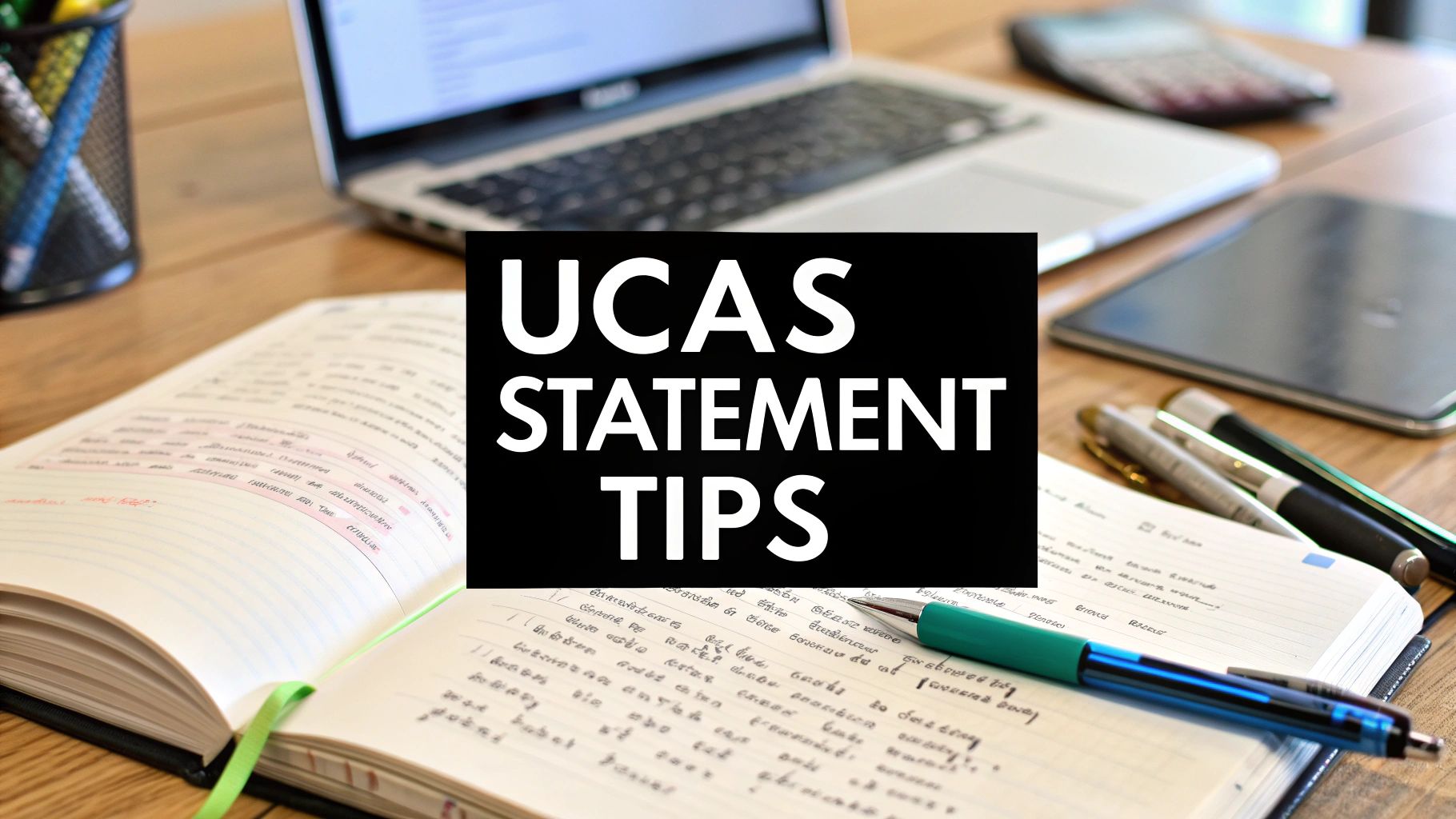So, you're facing the UCAS personal statement. If that thought alone makes your heart beat a little faster, take a deep breath. This isn't just a form to fill out; it's the first real step towards the future you're dreaming of, and we're here to help you make it count. The whole process has changed for the better, especially if you’re applying for 2026 entry onwards.
Gone is the single, intimidating essay that often left students staring at a blank page, overwhelmed and wondering where on earth to start. UCAS has rolled out a new, structured format designed to be fairer and a whole lot less stressful for you. Instead of one long narrative, you’ll now answer three specific questions. This new approach puts your unique story front and centre, giving you a clear roadmap to show off your strengths without needing expensive coaching. It’s all about levelling the playing field so admissions tutors can hear your authentic voice and feel your excitement.
Understanding The New UCAS Personal Statement
Why The Big Change?
This isn’t just a random tweak. The move to a question-based format came directly from feedback from students and teachers just like you, who found the old system pretty tough to navigate. The new approach is all about reducing that feeling of anxiety and making it crystal clear what universities actually want to know about you, the person behind the application.
This new structure helps you in a few key ways:
- It keeps you focused: Each question points you towards a specific area, so you can pour your energy into what matters without rambling.
- It’s much fairer: Everyone answers the same questions, which means your passion and potential can shine through on a level playing field.
- It cuts down the stress: You no longer have that immense pressure of crafting a perfect essay from a blank slate. You’ve got a framework to build on, one step at a time.
The infographic below gives a quick snapshot of how the old free-text format stacks up against the new question-based structure.
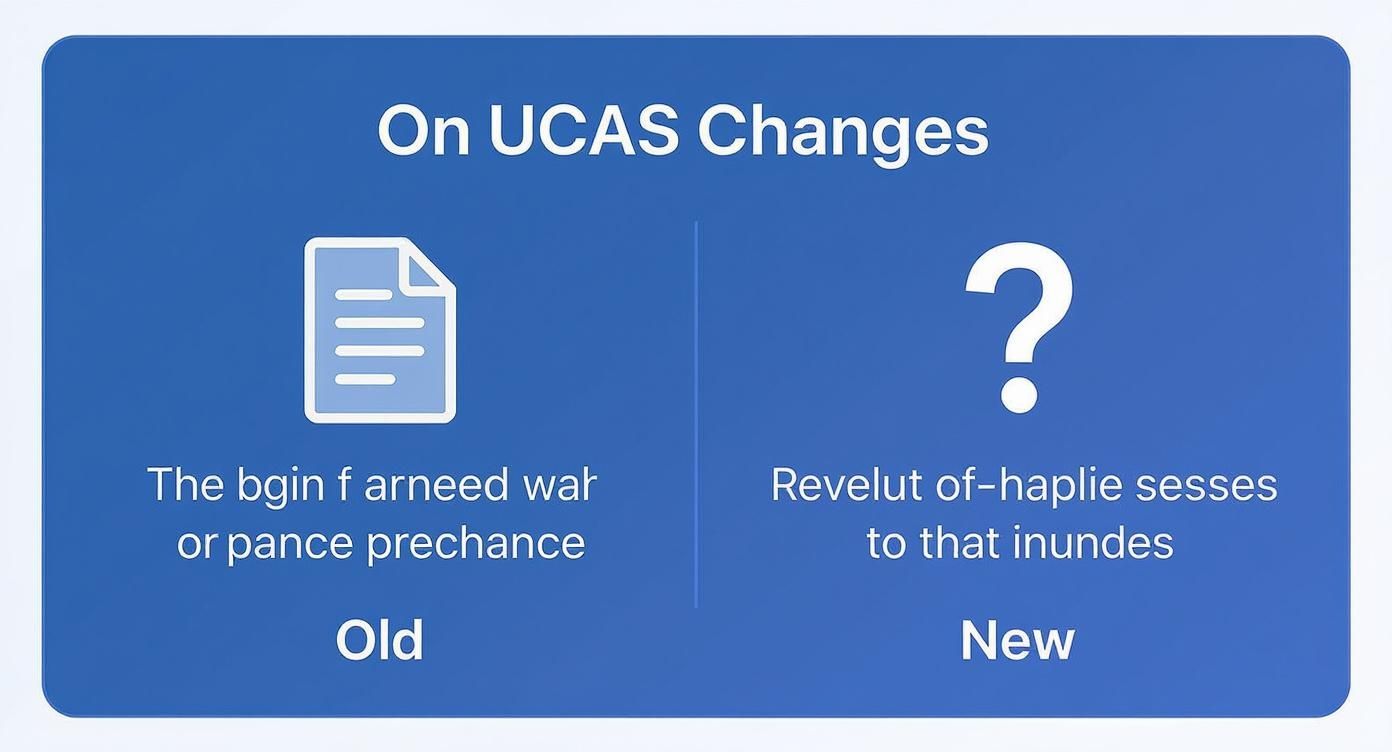
As you can see, it’s a shift from a single, open-ended task to a more guided and accessible format that helps you organise your thoughts much more effectively.
To give you a clearer idea of what’s changing, here's a quick comparison.
UCAS Personal Statement Old vs New Format
| Feature | Old Format (Pre-2026 Entry) | New Format (2026 Entry Onwards) |
|---|---|---|
| Structure | A single, continuous essay (up to 4,000 characters). | Three structured questions with set character limits. |
| Guidance | Very open-ended; students had to figure out what to include. | Clear prompts guiding you on what to cover, making it less of a guessing game. |
| Focus | Often became a narrative of achievements and experiences. | Targeted responses on your motivation, preparation, and unique skills. |
| Fairness | Could favour those with access to external writing support. | Aims to level the playing field by standardising the format, so your voice is heard. |
| Stress Level | High, due to the pressure of crafting a perfect single essay. | Lower, as the task is broken into manageable chunks, giving you space to breathe. |
This new approach is a big step forward, making the whole process more about your potential and less about your ability to write a flawless essay under pressure.
The Three Core Questions
At the heart of the new personal statement are three key questions. Think of them less as hurdles and more as opportunities to let your personality and passion shine through. They’re designed to give admissions tutors a complete, human picture of who you are.
- Motivation for the course: Why do you want to study this subject? What is it about this path that excites you?
- Preparedness through study: How has your learning so far prepared you for this course and ignited your curiosity?
- Wider experiences: What have you done outside of your studies that makes you suitable and shows who you are?
These questions are your chance to tell a compelling story, and the new format has received strong backing from educators who feel it’s a major improvement for students. In fact, a UCAS survey found that 65% of teachers in England agreed the reform was an improvement. That figure jumped to 73% in disadvantaged schools, proving it’s already having a positive impact on fairness.
If you’re looking for more detailed advice on how to tackle your answers, there are some excellent tips for writing a standout personal statement that can really help you highlight your strengths.
The new UCAS format isn't about making things harder; it's about making them clearer. It's an invitation to be specific, authentic, and reflective, ensuring the person reading your application sees the real you—your hopes, your journey, and your potential—not just a polished essay.
By breaking down the task, you can focus on one part at a time, making the process of writing a UCAS personal statement feel much more achievable. This system is all about empowering you to talk about your journey and ambitions with real confidence.
Answering ‘Why This Course?’
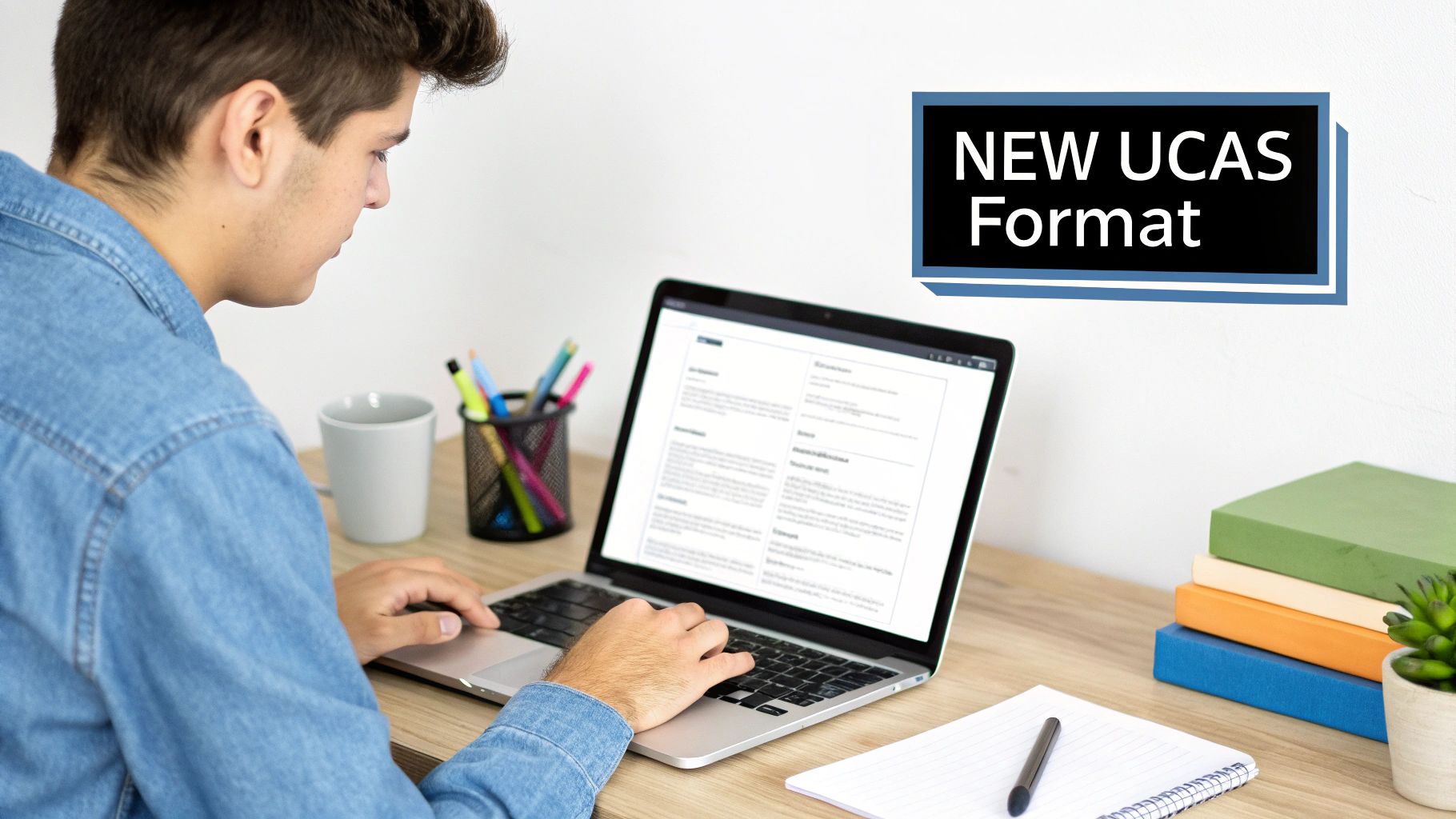
Right, this is where your story really kicks off. This is your moment to show the admissions tutor the genuine spark that led you to their course. They’ve read countless statements that start with "I've always been interested in…"—what they’re really searching for is the feeling behind your words. They want to connect with your excitement and understand the personal journey behind your choice.
So, take a moment. Think back. When did your interest truly take root? What was the catalyst? This isn't about inventing something grand; it's about finding your authentic story and telling it with the passion you truly feel.
Finding Your Lightbulb Moment
Every great personal statement has an origin story, a moment that made your heart skip a beat. Forget trying to sound like the perfect student and just be honest. The most memorable answers often spring from small, personal experiences that reveal a much deeper connection to a subject.
What was your 'lightbulb moment'?
- Was it a documentary that completely flipped how you saw the world, leaving you full of questions?
- A conversation with a grandparent that sparked a curiosity you couldn't shake?
- A really tough problem in a lesson that you just had to solve, feeling a rush when you finally cracked it?
This moment is the emotional core of your answer. It shows your interest isn't just academic—it's part of who you are.
Practical Example: Someone applying for Computer Science shouldn't just say they enjoy coding. They could talk about the thrill of building their first clunky website for a school project—the late-night frustration of debugging, the absolute joy of seeing it finally go live, and how that one experience made them desperate to understand the architecture behind our digital world. That story is real, relatable, and packed with genuine passion.
From Spark to Sustained Passion
A single moment is a brilliant start, but admissions tutors need to see that you’ve nurtured that initial spark. What did you do next? This is where you connect that initial curiosity to your actions, proving your passion is more than just a passing interest. You need to show them this is something you live and breathe.
Think about the steps you took after that discovery. Did you:
- Binge-read books or articles that went way beyond your A-Level syllabus?
- Fall down a rabbit hole of online lectures or follow experts in the field?
- Start a small project of your own just to see if you could?
Showing this kind of initiative is gold. It tells the university you're a proactive, independent learner who is genuinely invested in their subject.
Admissions tutors read thousands of statements. The ones that stick are those that tell a story. They want to feel the journey of your intellectual curiosity—from the first spark to the sustained flame that shows you're ready and excited for degree-level study.
Let's take another practical example. Imagine you're applying for History. A generic answer might just list the topics you enjoyed at A-Level. A powerful answer, however, could start with the story of finding your great-grandfather's war diaries in the attic.
From there, you could explain how that personal connection made history feel real and drove you to read beyond your textbooks, exploring historians who debated the very conflict your great-grandfather lived through. This narrative transforms you from a student who studies History into someone who feels its weight and relevance on a deeply personal level.
Connecting Your Passion to the Future
The final piece of the puzzle is looking ahead. Why is this specific course at this particular university the right next step for you? This shows you've done your homework and are serious about your application. Your answer should build a clear bridge between your past passion and your future ambitions.
Dodge vague statements like "your university has a great reputation." Get specific. Mention a particular module that makes you excited, a unique research opportunity, or a lecturer whose work genuinely inspires you. Crucially, explain why that element resonates with you and how it fits into your story.
Here’s a practical example of how you can frame that connection:
- Your Past: "My fascination with marine biology began when I volunteered for a beach clean-up and saw the devastating impact of plastic pollution firsthand. It felt personal."
- Your Actions: "This pushed me to research the work of Dr Jane Smith on microplastics, and I've been following her publications ever since, inspired by her innovative approach."
- Your Future with Them: "The opportunity to study the 'Marine Ecosystems Under Threat' module, taught by Dr Smith at your university, would be incredible. It would allow me to deepen my understanding and, hopefully, one day contribute to finding the practical solutions our oceans so desperately need."
This approach shows a clear, logical progression. It proves you're not just applying randomly; you have a deliberate, thoughtful reason for choosing them. It’s this level of detail and personal connection that will make your statement truly unforgettable.
Proving You're Ready for University-Level Work
This is where you make the leap from listing your A-Levels to showing an admissions tutor what you’ve actually learned from them. Your grades are the 'what'; this part of your personal statement is the 'how' and the 'why'. It’s your chance to prove you’ve got the academic muscle and the curious mind needed to thrive on your chosen degree course.
Think about it this way: how did dissecting a poem in English class teach you to handle ambiguity? Why was that frustrating physics experiment a vital lesson in problem-solving? This is where you bring your classroom experiences to life, showing you’re a capable, prepared, and deeply curious student.
Turning Schoolwork into Scholarly Skills
Every subject you’ve studied has equipped you with a specific set of tools. Your job is to pull them out of the toolbox and show the admissions tutor how they’re relevant to the course you’re applying for. Don’t just state the obvious—dig a little deeper and connect it to your own growth.
Admissions tutors aren't just looking for passion; they're looking for proof. They need to see evidence that you can think critically, analyse information, and build a logical argument. These are the absolute foundations of university study, and you’ve been practising them for years, probably without even realising it.
Let's take a real-world scenario. A student applying for a Law degree might worry their History A-Level isn't a perfect match. But look closer at the skills you developed:
- Analysing sources: You had to evaluate historical documents, weighing up bias and considering context. That’s exactly the kind of critical thinking you’ll be doing with legal texts.
- Constructing an argument: You wrote essays defending a particular interpretation, using evidence to back up your claims. This is the very bedrock of legal reasoning.
- Understanding complexity: You learned that historical events rarely have a single, simple cause. This appreciation for nuance is critical in the legal world.
Framed this way, that History A-Level becomes powerful evidence of your readiness for a Law degree.
Practical Examples of Academic Readiness
Here’s how you can turn specific school experiences into compelling, concrete proof for your statement, showing the person behind the grades.
Example 1: Applying for Engineering
"My A-Level Physics project, designing a small-scale trebuchet, was initially a lesson in failure. My first two designs couldn’t even launch the projectile, and I felt so frustrated. Instead of giving up, I systematically revisited my calculations for torque and trajectory, eventually realising my counterweight was inefficient. That 'aha!' moment was incredible. This process taught me that engineering isn’t just about getting the theory right; it's about persistent, iterative problem-solving and learning from mistakes to find a working solution."
See the difference? This doesn't just say, "I'm good at Physics." It tells a mini-story of resilience, emotion, and analytical thinking, demonstrating a practical grasp of the engineering mindset. It's far more memorable.
Example 2: Applying for Psychology
"While studying A Streetcar Named Desire for English Literature, I became fascinated not just with the text, but with Blanche DuBois's psychological decline. I felt a real connection to her vulnerability. This prompted me to read beyond the syllabus, exploring articles on defence mechanisms and narcissistic personality traits. Analysing her character through this psychological lens showed me how literary narratives can be powerful case studies of the human mind, cementing my desire to understand these concepts formally through a psychology degree."
This student shows genuine intellectual curiosity. They prove they’re an independent learner who can forge connections between different subjects—a skill that universities absolutely love. To really nail this, it helps to sharpen your writing skills. You can find some fantastic practical strategies on how to improve academic writing that will help you craft a truly high-impact statement.
Aligning with the New UCAS Format
Under the new UCAS personal statement reforms, this section is more important than ever. It directly addresses the question about how your studies have prepared you for your chosen course. It’s no longer blended into one long essay but stands as a distinct section where you need to be sharp and focused.
Tutors from top universities are advising applicants to clearly separate their answers into three key areas: your motivation for the course, your academic readiness from schoolwork, and your relevant extracurriculars. This new format, with its tight character limits, demands a more strategic approach.
The most powerful statements don’t just list accomplishments. They reflect on them. Show the admissions tutor you understand the value of your academic experiences and can articulate how they’ve prepared you for the intellectual and emotional journey ahead.
Ultimately, this section is your proof. It's the hard evidence that backs up your passion. By thoughtfully connecting your A-Level experiences to the demands of your chosen degree, you paint a picture of a student who isn't just hopeful, but genuinely ready to hit the ground running.
Connecting Life Experiences to Your Application
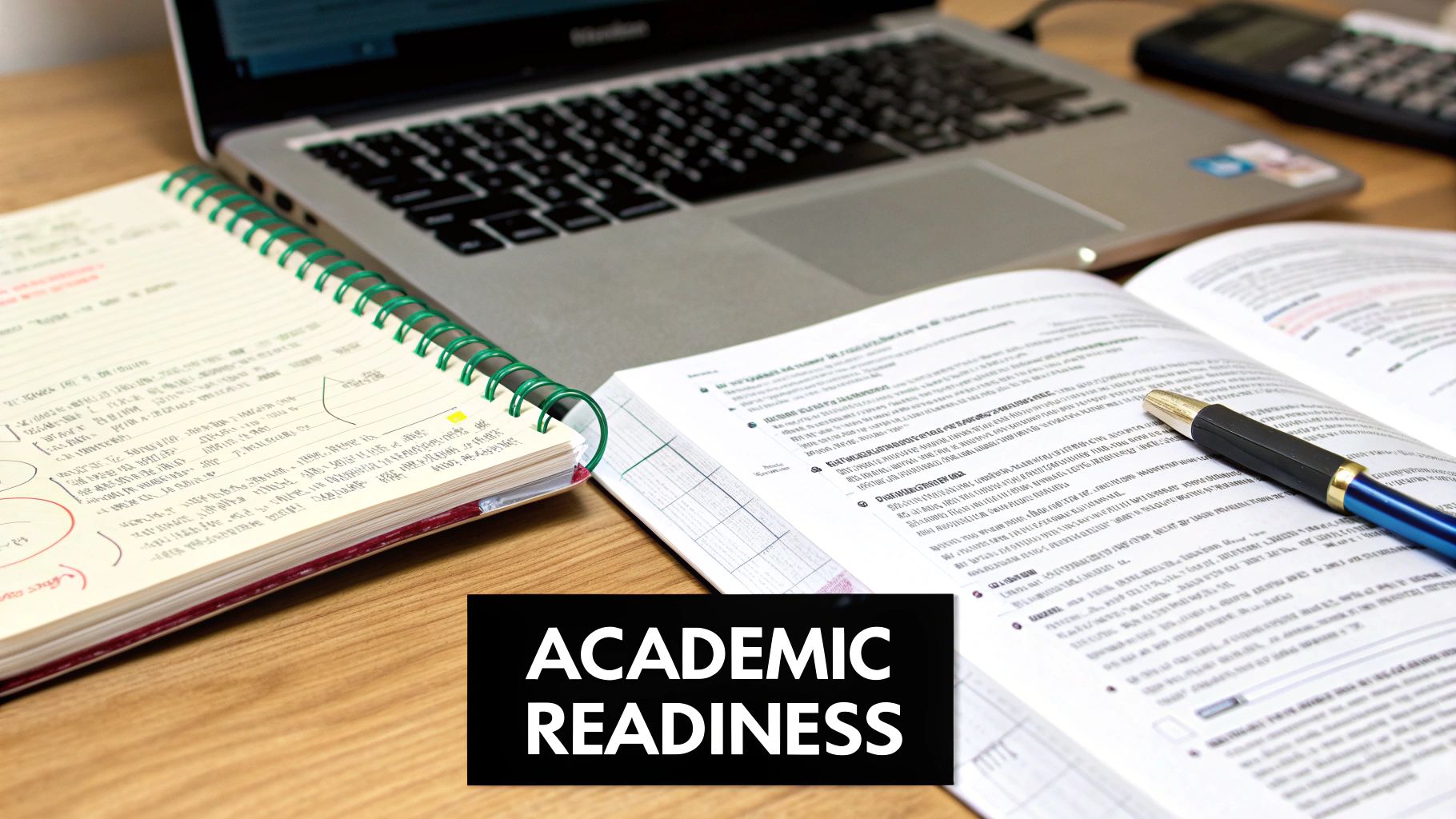
This is your chance to show the admissions tutor the real person behind the grades. Your journey outside of lessons—whether it's a part-time job, volunteering, or even a personal hobby—has given you skills and perspective that exams can't measure. This section is all about weaving those experiences into your application in a way that feels genuine and powerful.
It’s not enough to simply list what you’ve done. The real magic happens when you explain the ‘so what?’ of it all. How did that Saturday job teach you about responsibility? What did coaching the under-10s football team reveal about leadership and patience? This is where you paint a complete picture of yourself, proving you have qualities like resilience, initiative, and teamwork that are essential for university and for life.
Beyond the Job Title: The Skills You Gained
Admissions tutors know you have a life outside of school, but you need to connect the dots for them. A part-time job in a busy café isn't just about making coffee; it's a masterclass in time management, empathy, and working under pressure.
Think about the challenges you faced and what they taught you. Did you have to handle a difficult customer and feel your stomach drop? That’s conflict resolution. Did you have to balance your shifts with a heavy revision schedule? That’s brilliant evidence of your self-discipline and organisational skills. These are exactly the kinds of attributes that prove you’re ready for the demands of university life.
Let’s look at a concrete example for an applicant interested in Business Management:
"Working weekends at a local retail store for the past year has been more than just a job; it's been a practical lesson in business operations. I was responsible for managing stock levels for my section, which taught me the importance of inventory control. But the biggest lesson came when a delivery was late on a busy Saturday. I felt the team's panic, but learned to communicate clearly and calmly with customers, managing expectations and finding alternatives. It taught me that business isn't just about numbers; it's about people and problem-solving under pressure."
This example doesn't just state the job. It unpacks the experience with emotion, highlighting specific, relevant skills and showing an ability to reflect on what was learned.
The Power of Volunteering and Hobbies
Your passions and the time you give back to your community speak volumes about your character. These activities are often where your personal values shine through, and they can provide some of the most compelling stories for your UCAS personal statement.
Again, the key is to move from description to reflection. What did the experience teach you about yourself or the world around you? How did it make you feel?
- Volunteering at an animal shelter: This shows compassion, but it also demonstrates reliability and a willingness to handle the messy, emotionally difficult tasks.
- Being part of a drama club: This isn't just about acting; it's about collaboration, trusting your peers, and having the courage to be vulnerable in front of an audience.
- Coding a simple game in your spare time: This shows initiative, persistence, and a genuine passion for your subject that extends beyond the classroom.
These activities are a huge part of your personal development. If you want to dive deeper into how these experiences contribute to your growth, you can learn more about the power of extracurricular activities in our detailed guide.
Articulating Your Personal Growth
Now, let's tie it all together. Imagine you’re applying for a course in Social Work and you’ve been volunteering at a local food bank.
A simple, forgettable approach would be:
"I have volunteered at a local food bank for six months."
This is a fact, but it tells the admissions tutor nothing about you.
A much more powerful approach would be:
"My time volunteering at the local food bank has been deeply impactful. It moved beyond simply handing out supplies; it was about listening. I learned to offer a moment of dignity and empathy to people facing immense hardship, hearing their stories and feeling a fraction of their struggle. This experience solidified my belief that I want a career where I can support vulnerable individuals, and it has given me a real-world understanding of the social challenges I hope to address in my studies."
This version is emotionally resonant. It demonstrates empathy, maturity, and a clear link between your experience and your future goals. It tells a story of personal growth and makes your motivation for the course feel incredibly genuine and heartfelt. This is how you transform a simple activity into a compelling reason to offer you a place.
Polishing Your Statement with Confidence
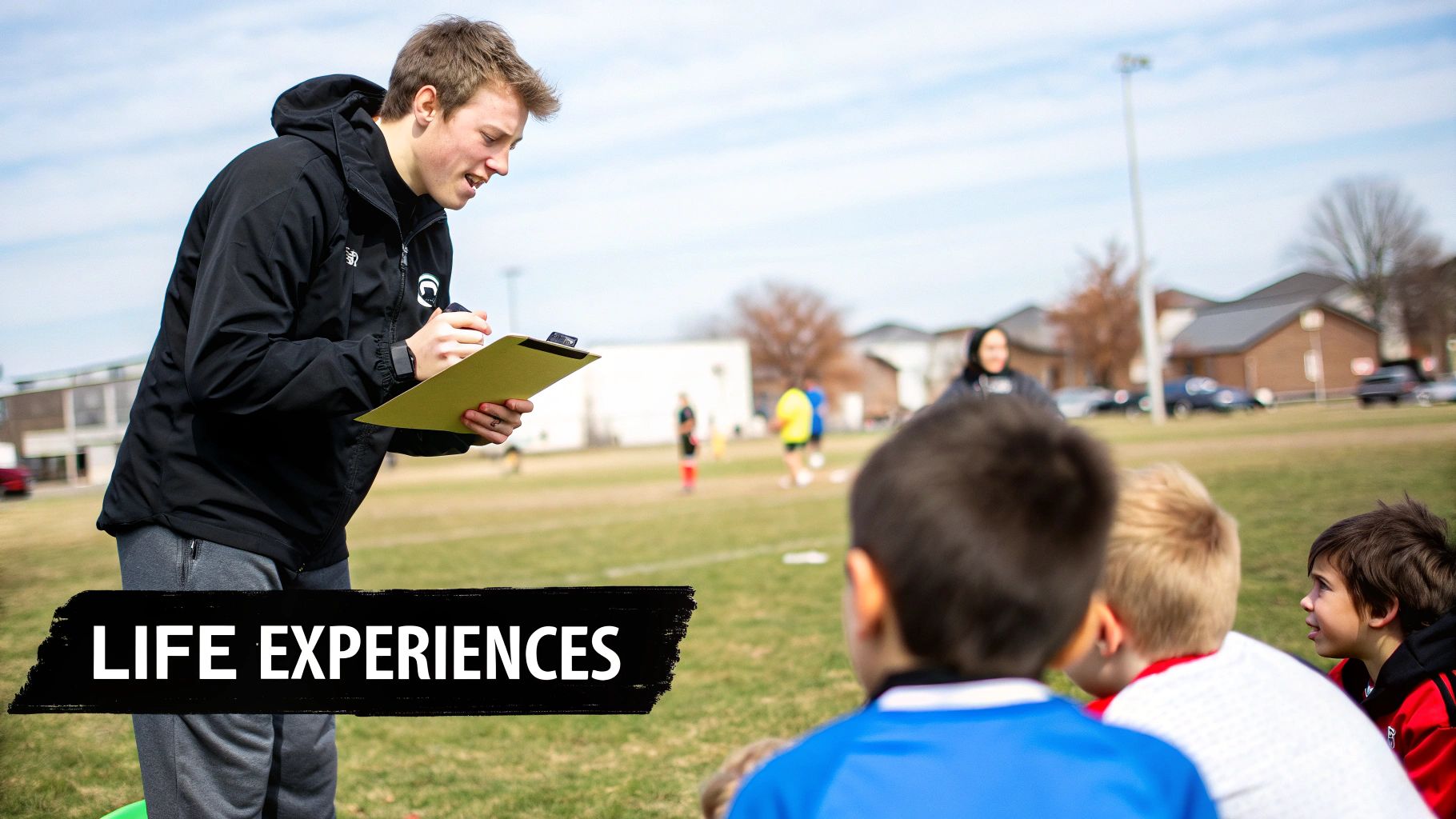
You’ve poured your heart, your memories, and your ambitions onto the page. The heavy lifting is done. Now it’s time for the final, crucial step: polishing your words until they shine. This is what separates a good statement from a great one, making sure your voice comes through with clarity and impact.
Editing can feel like a chore after all that writing, but it’s your last chance to make a powerful impression. This isn’t just about spotting typos; it's about refining your story so that it genuinely connects with the admissions tutor on the other side of the screen. Think of it as tuning an instrument—the notes are there, but a few small adjustments can make the melody perfect, allowing you to finally feel that sense of relief and pride in your work.
The Power of Reading Aloud
This sounds almost too simple to be effective, but trust me, it's one of the best editing tricks in the book. When you read your statement out loud, your ears will catch clumsy phrasing and awkward sentences that your eyes simply skim over.
Does a sentence make you stumble? It needs a rewrite. Does the flow from one paragraph to the next feel jerky? You might need to add a better transition. This simple act helps you find the natural rhythm of your writing, ensuring it sounds like an authentic, confident version of you—not a robot.
With competition for university places getting tougher every year, this level of polish matters more than ever. As of January 2025, a record 600,660 applicants applied through UCAS, with the number of UK 18-year-olds hitting an all-time high. A slick, well-written personal statement is your best tool for standing out in a crowded field. You can read up on the latest UCAS application statistics to see what you're up against.
Get a Fresh Pair of Eyes
After spending hours staring at the same 4,000 characters, you become blind to your own mistakes. You'll start to read what you meant to write, not what's actually on the page. That's why getting feedback from someone you trust is non-negotiable.
Ask a teacher, a careers advisor, or a family member to give it a read. Pick someone who knows you well but who will also give you honest, constructive feedback. Don't just ask, "Is it good?" Guide them with specific questions:
- Does this genuinely sound like me?
- Can you feel my passion for the subject?
- Are there any parts you found confusing or unclear?
- What was the main thing you took away from reading it?
Getting this outside perspective helps you spot weaknesses you would have otherwise missed. It takes a bit of courage to share your work, but it’s an essential step in making it the best it can be.
A Final Polish: The Do's and Don'ts Checklist
Before you get anywhere near that 'submit' button, it's a good idea to run through a final checklist to catch any common mistakes. It's easy to fall into traps that weaken your statement, often in an attempt to sound more impressive than you need to. This quick guide will help you steer clear of those pitfalls.
Your personal statement is the one part of your application where your personality can truly come through. Don’t hide it behind clichés or stuffy, overly formal language. Let the admissions tutor hear your voice and feel your passion.
The table below is a handy reference for your final review. Use it to double-check that you're presenting the best, most authentic version of yourself.
Personal Statement Do's and Don'ts Checklist
| Do | Don't |
|---|---|
| Be specific and use concrete, emotional examples. Show, don't just tell. | Use clichés. Avoid worn-out phrases like "from a young age" or "passion for learning." |
| Proofread meticulously for grammar and spelling. Small errors can look careless. | Quote famous people. Admissions tutors want to hear your words, not someone else's. |
| Let your genuine enthusiasm shine through. Authenticity is your greatest strength. | Try to sound overly academic or use a thesaurus for every other word. It often comes across as unnatural and hides the real you. |
| Check you have answered all parts of each question. Ensure your responses are complete. | Exaggerate or lie. Your school will be asked to verify your achievements, so always be truthful. |
Once you’ve gone through this list and made your final tweaks, you can feel confident that you’ve done everything you can to make your statement stand out for all the right reasons. Good luck!
Common Questions About the UCAS Statement
Getting to the final stages of your UCAS application can feel like the home straight of a marathon. It’s totally normal to have a few last-minute questions bubbling up. You’ve put so much work in, and you just want to be sure everything is perfect before you hit ‘submit’. That feeling of nervous excitement is completely valid.
Think of this section as your final checklist. We're here to tackle some of the most common worries students have, offering clear, straightforward advice to help you send off your application with complete confidence.
What if I'm Applying for Different Courses?
This is a classic dilemma, and probably one of the most common questions we hear. But don't worry, there's a smart way to handle it. The secret is to find the common thread that weaves through all your choices, the central passion that connects them.
Instead of getting bogged down in the specifics of each course title, zoom out. Focus on the bigger picture: the transferable skills and the core intellectual interests that connect your subjects.
Let's say you're torn between Psychology and Sociology. Rather than writing separate paragraphs for each, you could talk about your deep fascination with human behaviour, your curiosity about societal structures, and your knack for critical analysis.
- Your Interest: Frame your motivation around a core desire to understand why people and groups act the way they do. This is central to both disciplines.
- Your Skills: Talk about your ability to dissect complex information, weigh up different theories, and build a reasoned argument. These are skills every admissions tutor for these subjects is looking for.
This strategy keeps your statement focused and passionate. It paints a picture of a well-rounded applicant driven by genuine intellectual curiosity, which is far more compelling than trying to please everyone.
Should I Mention Challenges or a Dip in Grades?
Navigating this is tricky, but honesty—when framed correctly—can be a powerful tool. If you’ve faced genuine personal challenges that affected your academic performance, it might be worth mentioning. The key is how you tell the story.
The focus must always be on what you learned and how you grew from the experience.
Don't dwell on the hardship itself. Instead, highlight the resilience, maturity, and problem-solving skills you gained. Show the admissions tutor how overcoming that obstacle has made you a more focused and determined student today. Your vulnerability can be your strength.
That said, your personal statement isn't always the best place for this information. Often, it carries more weight when your referee mentions any extenuating circumstances in their reference. This provides third-party validation and keeps your statement focused on your academic and personal strengths.
It’s also helpful to remember that grades are just one piece of the puzzle. Universities look at the whole picture. To get a better sense of how your qualifications fit into the wider admissions system, it’s worth reading our guide to define UCAS points.
At Queens Online School, we believe every student has a unique story to tell. Our small class sizes and dedicated, subject-specialist teachers are here to guide you through every step, from polishing your personal statement to nailing your A-Levels. Discover how our personalised online learning can help you succeed.

